牛津深圳版九年级下册 Module 1 Unit 1 Great explorations 单元基础过关习题课件 (共34张PPT)
文档属性
| 名称 | 牛津深圳版九年级下册 Module 1 Unit 1 Great explorations 单元基础过关习题课件 (共34张PPT) | 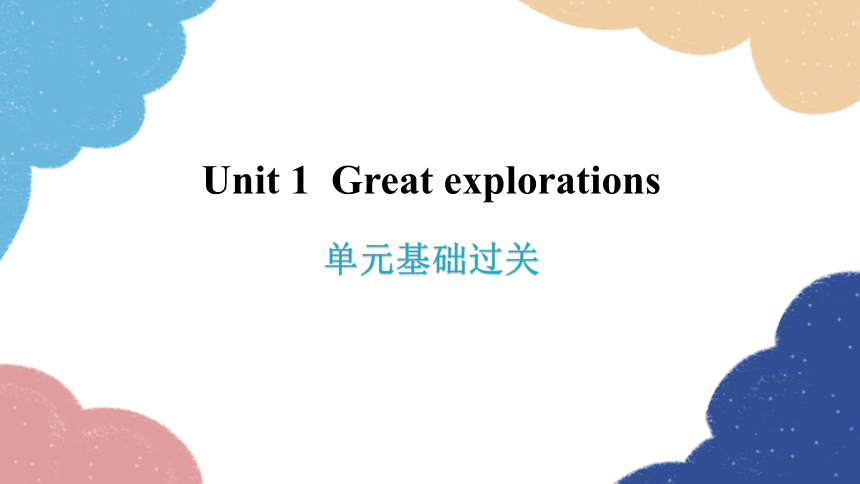 | |
| 格式 | pptx | ||
| 文件大小 | 431.3KB | ||
| 资源类型 | 教案 | ||
| 版本资源 | 牛津深圳版 | ||
| 科目 | 英语 | ||
| 更新时间 | 2022-10-03 09:39:10 | ||
图片预览


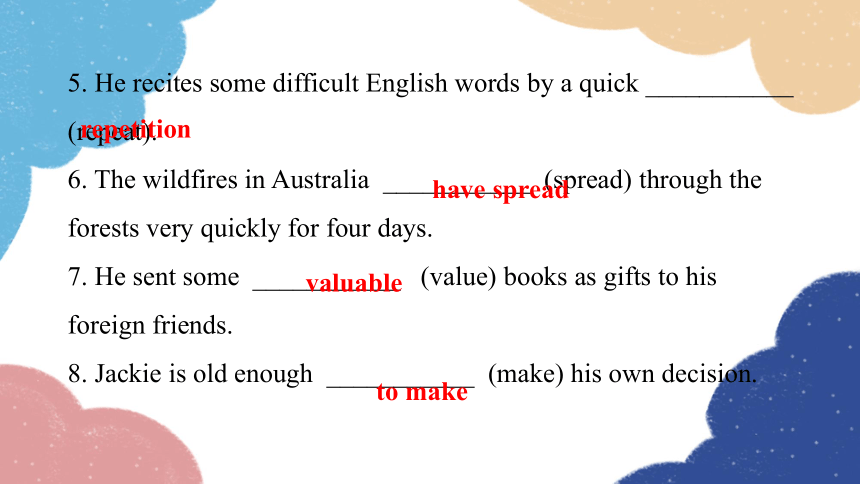
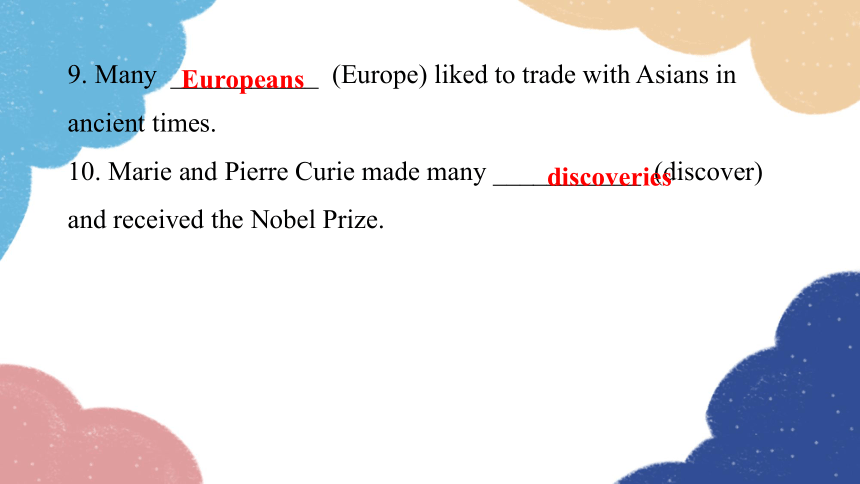
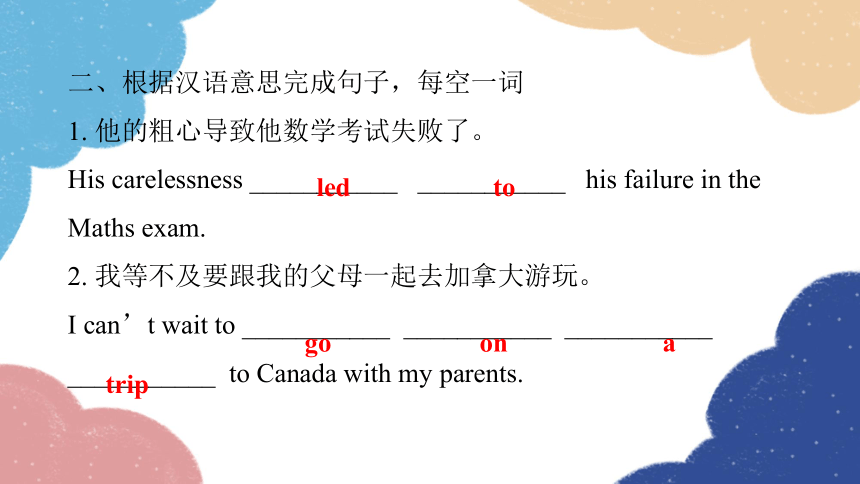


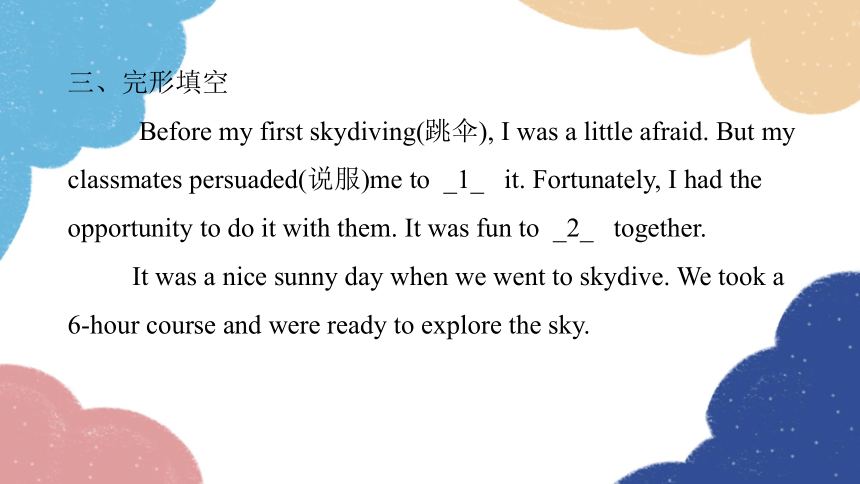
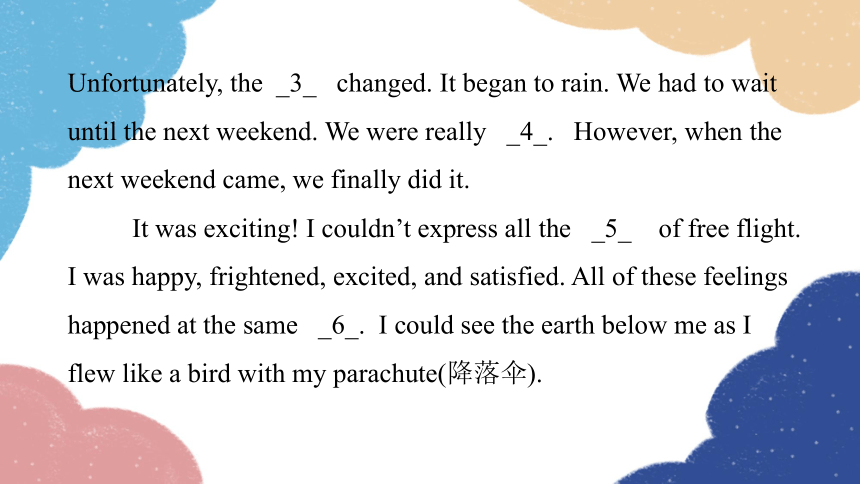
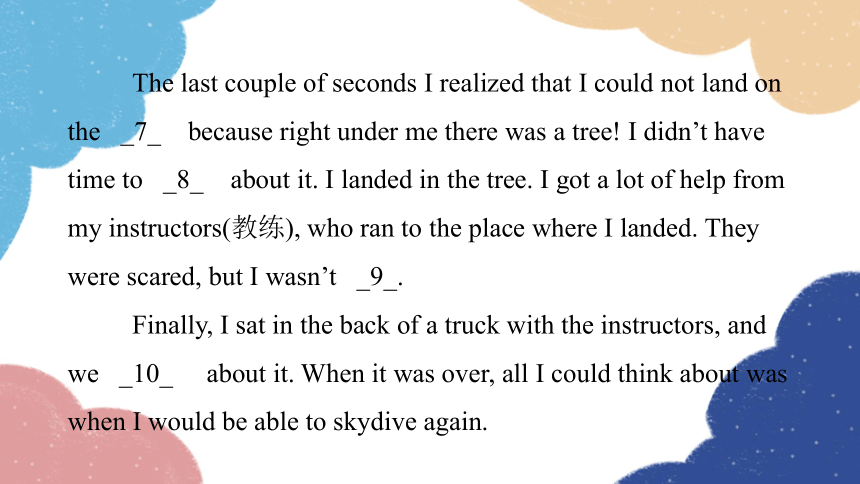

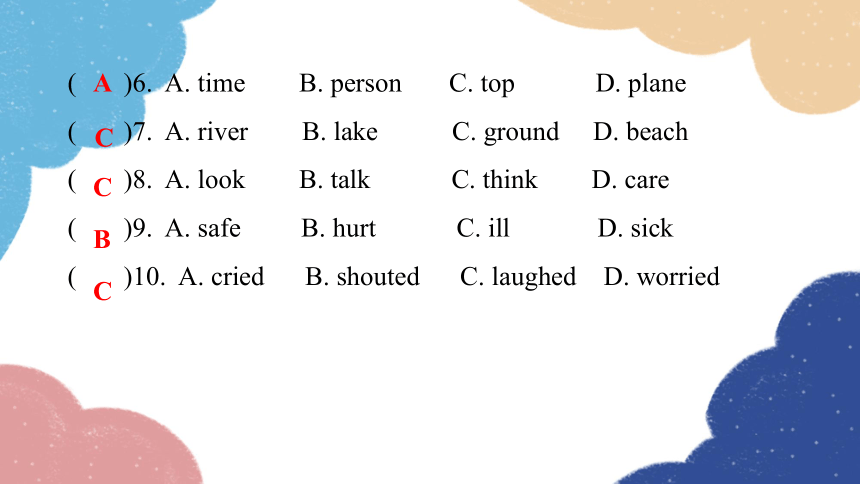
文档简介
(共34张PPT)
Unit 1 Great explorations
单元基础过关
一、用所给单词的适当形式填空
1. China is a great country with 56_____________ (people).
2. Although our country is a ___________ (develop) country, it has ___________ (develop) rapidly in every field.
3. His task is ___________ (prepare)goods for supermarkets.
4. Shenzhen ___________ (know) as “the Window of Reform and Opening”.
peoples
developing
developed
to prepare
is known
5. He recites some difficult English words by a quick ___________ (repeat).
6. The wildfires in Australia ___________ (spread) through the forests very quickly for four days.
7. He sent some ___________ (value) books as gifts to his foreign friends.
8. Jackie is old enough ___________ (make) his own decision.
repetition
have spread
valuable
to make
9. Many ___________ (Europe) liked to trade with Asians in ancient times.
10. Marie and Pierre Curie made many ___________ (discover) and received the Nobel Prize.
Europeans
discoveries
二、根据汉语意思完成句子,每空一词
1. 他的粗心导致他数学考试失败了。
His carelessness ___________ ___________ his failure in the Maths exam.
2. 我等不及要跟我的父母一起去加拿大游玩。
I can’t wait to ___________ ___________ ___________ ___________ to Canada with my parents.
led
to
go
on
a
trip
3. 上周末他们不仅去了长城,还去了故宫。
Last weekend, they went to the Great Wall ___________ ___________ ___________ the Palace Museum.
4. 本学期末我们学校将有一场才艺表演。
There will be a talent show in our school ___________ ___________ ___________ ___________ this term.
as
well
as
at
the
end
of
5. 这个箱子对于她来说太重了,她扛不动。
The box is ___________ heavy for her ___________ ___________.
too
to
carry
三、完形填空
Before my first skydiving(跳伞), I was a little afraid. But my classmates persuaded(说服)me to _1_ it. Fortunately, I had the opportunity to do it with them. It was fun to _2_ together.
It was a nice sunny day when we went to skydive. We took a 6-hour course and were ready to explore the sky.
Unfortunately, the _3_ changed. It began to rain. We had to wait until the next weekend. We were really _4_. However, when the next weekend came, we finally did it.
It was exciting! I couldn’t express all the _5_ of free flight. I was happy, frightened, excited, and satisfied. All of these feelings happened at the same _6_. I could see the earth below me as I flew like a bird with my parachute(降落伞).
The last couple of seconds I realized that I could not land on the _7_ because right under me there was a tree! I didn’t have time to _8_ about it. I landed in the tree. I got a lot of help from my instructors(教练), who ran to the place where I landed. They were scared, but I wasn’t _9_.
Finally, I sat in the back of a truck with the instructors, and we _10_ about it. When it was over, all I could think about was when I would be able to skydive again.
( )1. A. write B. do C. stop D. forget
( )2. A. jump B. play C. exercise D. climb
( )3. A. place B. price C. weather D. chance
( )4. A. interested B. sleepy C. excited D. unhappy
( )5. A. skills B. feelings C. looks D. colours
B
A
C
D
B
( )6. A. time B. person C. top D. plane
( )7. A. river B. lake C. ground D. beach
( )8. A. look B. talk C. think D. care
( )9. A. safe B. hurt C. ill D. sick
( )10. A. cried B. shouted C. laughed D. worried
A
C
C
B
C
四、阅读理解
(一)
Helen Thayer, one of the greatest explorers of the 20th century, loved challenges. She said, “I like to see what’s on the other side of the hill.” She has gone almost everywhere to do that.
In 1988, at the age of 50, she became the first woman to travel alone to the North Pole. She pulled her own sled (雪
橇)with 160 pounds of supplies, and during her trip no one brought her fresh supplies. Accompanied only by her dog Charlie, she survived cold weather and meetings with polar bears. In fact, Charlie saved her life when one of the polar bears attacked her. Near the end of her trip, a strong wind blew away most of her supplies. The last week of the trip, she survived on a little food and water each day.
Helen went to challenging places not only for adventure, but also for education. Before her Arctic journey, she started a website called Adventure Classroom. On the site, she shared her adventures in order to encourage students. She explained, “Although kids often see the world in a negative way, without hope for their future, we work to encourage them to set goals and make plans for success and tell them never to give up. ”
Helen grew up in New Zealand. Her parents were athletes and mountain-climbers. Following her parents’ example, she climbed her first mountain at nine. Later she climbed the highest mountains in North and South America, the former USSR and New Zealand.
In 1996, she took on another challenge—the Sahara Desert. She and her husband, Bill, walked 2,400 miles across it!
In 2001, she and Bill travelled on foot from West to East through the Gobi Desert in Mongolia. They hope to travel in Chinese mainland into Sichuan and Tibet to study pandas next time.
Helen plans to continue taking trips. She’ll use her drawing, writing, photography and environmental work to create programmes for her Adventure Classroom website. She wants to encourage her students never to stop facing challenges!
( )1. What happened to Helen Thayer during the trip to the North Pole
A. She caught a bad cold.
B. She was attacked by a polar bear.
C. Her dog Charlie was badly hurt.
D. She lost all her food.
B
( )2. What does the underlined word“negative” mean in Chinese
A. 乐观的 B. 相似的 C. 普通的 D. 消极的
( )3. Which place hasn’t Helen Thayer been to in this article
A. Tibet. B. New Zealand.
C. South America. D. The Sahara Desert.
D
A
( )4. Which of the following is TRUE according to the article
A. Helen Thayer was the first woman to travel to the South Pole.
B. Helen Thayer started a website to teach children how to climb.
C. Helen Thayer climbed her first mountain when she was nine.
D. Helen and her husband travelled through the Gobi Desert in 1996.
C
( )5. What is the best title of this article
A. Helen Thayer and her dog
B. Taking trips in dangerous places
C. Adventure Classroom—a helpful website
D. Helen Thayer—a great explorer
D
(二)
短文填空。以下是一则短文,请阅读短文,并从下列方框里的六个句子中选择五个还原到原文中,使原文的意思完整、连贯。
A. Thousands of workers died from illnesses and accidents.
B. The US spent a lot of money on the canal.
C. It is in Central America and is about 80 kilometres long.
D. It crosses three mountains and more than 800 rivers.
E. The US continued the project in 1904 and finished it in 1914.
F. But, how could they get oil from Alaska to the rest of the US
What was the most dangerous engineering project It was the Panama Canal (巴拿马运河). 1. _____ It lets ships pass between the Atlantic and Pacific oceans. The French started the project in the 1880s. However, the work was too difficult, and they stopped. 2. _____ About 56,300 people worked on the canal.
C
E
The area around the canal was very dangerous. It was very hot and wet, with about 267 centimetres of rain in a year. The heavy rain often made the rivers flood. 3. _____
One of the greatest engineering achievements of the 20th century was the Alaska Pipeline (阿拉斯加大油管). In 1968, an oil company found the largest oil field in North America.
4. _____
A
F
They worked with some other oil companies to build a pipeline.
The Alaska Pipeline is one of the longest pipelines in the world. It carries oil for 800 miles through the cold, hard land of Alaska. 5. _____ More than 70,000 workers built it. They worked for more than three years in very cold temperatures. They finished the work in 1977.
D
五、语法填空
Malala Yousafzai, is a Pakistani youth activist. She is the youngest Nobel Prize 1._______ (win) in history. She was awarded the Nobel Peace Prize 2. _______ 10 October, 2014.
Yousafzai was 3._______ (bear) in 1997 in Mingora, the Swat District of northwest Pakistan to a Sunni Muslim family. 4._______ she was just 11 years old, she started blogging
winner
on
born
When
about the Taliban’s takeover of her hometown. Taliban members believed young girls should not go to school. Classrooms throughout the Swat district were 5._______ (close) for several months. Malala spoke 6._______ (public) about her desire to go back to school. “All I want 7. _______ (be) an education,” she said.
closed
publicly
is
When the Pakistani government regained control, Malala was able to return to class. In 2012, she was nearly killed by the Taliban because she worked hard 8._______ (get) the same education for young girls. She became 9._______ symbol of the struggle for 10._______ (girl) rights all over the world.
to get
a
girls’
六、书面表达
假如你叫李华,下周你将为同学们介绍一位历史人物徐霞客,请你根据下面的内容要点写一篇关于徐霞客的人物介绍。
要点:
身份 明朝文学家、旅行家、 地理学家
爱好 自幼爱读史书、冒险类书籍;旅游
经历 21岁开始,30年间游历16个省;
记录60万字关于奇山地貌和当地居民生活习俗等的游记;
去世后,人们汇编成具有科学和文学价值的《徐霞客游记》。
提示词: 地理学家 geographer 地貌 landform
编辑 edit 民族nationality
要求:1. 80词左右;
2. 文中不得出现真实姓名和校名;
3. 可适当增加细节,以使条理清楚、行文连贯;
4. 标点正确,书面整洁。
_____________________________________________________________________________________________________________________________________________________________________________________________________________________________________________________________________________________________________________________________________________________________________
Xu Xiake was a writer, traveller and geographer in Ming Dynasty. When he was young, he liked reading historical books and adventure books. He also enjoyed travelling and he determined to travel around the world.
At the age of 21, he began to travel and it took him 30 years to travel to 16 provinces, leaving his footsteps in almost half of China. He wrote his travel diaries with a total
_____________________________________________________________________________________________________________________________________________________________________________________________________________________________________________________________________________________________________________________________________________________________________
of 600,000 words which recorded the detailed descriptions of mountains and landforms as well as the lives and customs of the local people.
After his death, people edited his notes into a book called “The Travel Diaries of Xu Xiake”. Xu Xiake made a great contribution to the ancient Chinese geography and the book now is of great scientific and literary value.
THANKS!
Unit 1 Great explorations
单元基础过关
一、用所给单词的适当形式填空
1. China is a great country with 56_____________ (people).
2. Although our country is a ___________ (develop) country, it has ___________ (develop) rapidly in every field.
3. His task is ___________ (prepare)goods for supermarkets.
4. Shenzhen ___________ (know) as “the Window of Reform and Opening”.
peoples
developing
developed
to prepare
is known
5. He recites some difficult English words by a quick ___________ (repeat).
6. The wildfires in Australia ___________ (spread) through the forests very quickly for four days.
7. He sent some ___________ (value) books as gifts to his foreign friends.
8. Jackie is old enough ___________ (make) his own decision.
repetition
have spread
valuable
to make
9. Many ___________ (Europe) liked to trade with Asians in ancient times.
10. Marie and Pierre Curie made many ___________ (discover) and received the Nobel Prize.
Europeans
discoveries
二、根据汉语意思完成句子,每空一词
1. 他的粗心导致他数学考试失败了。
His carelessness ___________ ___________ his failure in the Maths exam.
2. 我等不及要跟我的父母一起去加拿大游玩。
I can’t wait to ___________ ___________ ___________ ___________ to Canada with my parents.
led
to
go
on
a
trip
3. 上周末他们不仅去了长城,还去了故宫。
Last weekend, they went to the Great Wall ___________ ___________ ___________ the Palace Museum.
4. 本学期末我们学校将有一场才艺表演。
There will be a talent show in our school ___________ ___________ ___________ ___________ this term.
as
well
as
at
the
end
of
5. 这个箱子对于她来说太重了,她扛不动。
The box is ___________ heavy for her ___________ ___________.
too
to
carry
三、完形填空
Before my first skydiving(跳伞), I was a little afraid. But my classmates persuaded(说服)me to _1_ it. Fortunately, I had the opportunity to do it with them. It was fun to _2_ together.
It was a nice sunny day when we went to skydive. We took a 6-hour course and were ready to explore the sky.
Unfortunately, the _3_ changed. It began to rain. We had to wait until the next weekend. We were really _4_. However, when the next weekend came, we finally did it.
It was exciting! I couldn’t express all the _5_ of free flight. I was happy, frightened, excited, and satisfied. All of these feelings happened at the same _6_. I could see the earth below me as I flew like a bird with my parachute(降落伞).
The last couple of seconds I realized that I could not land on the _7_ because right under me there was a tree! I didn’t have time to _8_ about it. I landed in the tree. I got a lot of help from my instructors(教练), who ran to the place where I landed. They were scared, but I wasn’t _9_.
Finally, I sat in the back of a truck with the instructors, and we _10_ about it. When it was over, all I could think about was when I would be able to skydive again.
( )1. A. write B. do C. stop D. forget
( )2. A. jump B. play C. exercise D. climb
( )3. A. place B. price C. weather D. chance
( )4. A. interested B. sleepy C. excited D. unhappy
( )5. A. skills B. feelings C. looks D. colours
B
A
C
D
B
( )6. A. time B. person C. top D. plane
( )7. A. river B. lake C. ground D. beach
( )8. A. look B. talk C. think D. care
( )9. A. safe B. hurt C. ill D. sick
( )10. A. cried B. shouted C. laughed D. worried
A
C
C
B
C
四、阅读理解
(一)
Helen Thayer, one of the greatest explorers of the 20th century, loved challenges. She said, “I like to see what’s on the other side of the hill.” She has gone almost everywhere to do that.
In 1988, at the age of 50, she became the first woman to travel alone to the North Pole. She pulled her own sled (雪
橇)with 160 pounds of supplies, and during her trip no one brought her fresh supplies. Accompanied only by her dog Charlie, she survived cold weather and meetings with polar bears. In fact, Charlie saved her life when one of the polar bears attacked her. Near the end of her trip, a strong wind blew away most of her supplies. The last week of the trip, she survived on a little food and water each day.
Helen went to challenging places not only for adventure, but also for education. Before her Arctic journey, she started a website called Adventure Classroom. On the site, she shared her adventures in order to encourage students. She explained, “Although kids often see the world in a negative way, without hope for their future, we work to encourage them to set goals and make plans for success and tell them never to give up. ”
Helen grew up in New Zealand. Her parents were athletes and mountain-climbers. Following her parents’ example, she climbed her first mountain at nine. Later she climbed the highest mountains in North and South America, the former USSR and New Zealand.
In 1996, she took on another challenge—the Sahara Desert. She and her husband, Bill, walked 2,400 miles across it!
In 2001, she and Bill travelled on foot from West to East through the Gobi Desert in Mongolia. They hope to travel in Chinese mainland into Sichuan and Tibet to study pandas next time.
Helen plans to continue taking trips. She’ll use her drawing, writing, photography and environmental work to create programmes for her Adventure Classroom website. She wants to encourage her students never to stop facing challenges!
( )1. What happened to Helen Thayer during the trip to the North Pole
A. She caught a bad cold.
B. She was attacked by a polar bear.
C. Her dog Charlie was badly hurt.
D. She lost all her food.
B
( )2. What does the underlined word“negative” mean in Chinese
A. 乐观的 B. 相似的 C. 普通的 D. 消极的
( )3. Which place hasn’t Helen Thayer been to in this article
A. Tibet. B. New Zealand.
C. South America. D. The Sahara Desert.
D
A
( )4. Which of the following is TRUE according to the article
A. Helen Thayer was the first woman to travel to the South Pole.
B. Helen Thayer started a website to teach children how to climb.
C. Helen Thayer climbed her first mountain when she was nine.
D. Helen and her husband travelled through the Gobi Desert in 1996.
C
( )5. What is the best title of this article
A. Helen Thayer and her dog
B. Taking trips in dangerous places
C. Adventure Classroom—a helpful website
D. Helen Thayer—a great explorer
D
(二)
短文填空。以下是一则短文,请阅读短文,并从下列方框里的六个句子中选择五个还原到原文中,使原文的意思完整、连贯。
A. Thousands of workers died from illnesses and accidents.
B. The US spent a lot of money on the canal.
C. It is in Central America and is about 80 kilometres long.
D. It crosses three mountains and more than 800 rivers.
E. The US continued the project in 1904 and finished it in 1914.
F. But, how could they get oil from Alaska to the rest of the US
What was the most dangerous engineering project It was the Panama Canal (巴拿马运河). 1. _____ It lets ships pass between the Atlantic and Pacific oceans. The French started the project in the 1880s. However, the work was too difficult, and they stopped. 2. _____ About 56,300 people worked on the canal.
C
E
The area around the canal was very dangerous. It was very hot and wet, with about 267 centimetres of rain in a year. The heavy rain often made the rivers flood. 3. _____
One of the greatest engineering achievements of the 20th century was the Alaska Pipeline (阿拉斯加大油管). In 1968, an oil company found the largest oil field in North America.
4. _____
A
F
They worked with some other oil companies to build a pipeline.
The Alaska Pipeline is one of the longest pipelines in the world. It carries oil for 800 miles through the cold, hard land of Alaska. 5. _____ More than 70,000 workers built it. They worked for more than three years in very cold temperatures. They finished the work in 1977.
D
五、语法填空
Malala Yousafzai, is a Pakistani youth activist. She is the youngest Nobel Prize 1._______ (win) in history. She was awarded the Nobel Peace Prize 2. _______ 10 October, 2014.
Yousafzai was 3._______ (bear) in 1997 in Mingora, the Swat District of northwest Pakistan to a Sunni Muslim family. 4._______ she was just 11 years old, she started blogging
winner
on
born
When
about the Taliban’s takeover of her hometown. Taliban members believed young girls should not go to school. Classrooms throughout the Swat district were 5._______ (close) for several months. Malala spoke 6._______ (public) about her desire to go back to school. “All I want 7. _______ (be) an education,” she said.
closed
publicly
is
When the Pakistani government regained control, Malala was able to return to class. In 2012, she was nearly killed by the Taliban because she worked hard 8._______ (get) the same education for young girls. She became 9._______ symbol of the struggle for 10._______ (girl) rights all over the world.
to get
a
girls’
六、书面表达
假如你叫李华,下周你将为同学们介绍一位历史人物徐霞客,请你根据下面的内容要点写一篇关于徐霞客的人物介绍。
要点:
身份 明朝文学家、旅行家、 地理学家
爱好 自幼爱读史书、冒险类书籍;旅游
经历 21岁开始,30年间游历16个省;
记录60万字关于奇山地貌和当地居民生活习俗等的游记;
去世后,人们汇编成具有科学和文学价值的《徐霞客游记》。
提示词: 地理学家 geographer 地貌 landform
编辑 edit 民族nationality
要求:1. 80词左右;
2. 文中不得出现真实姓名和校名;
3. 可适当增加细节,以使条理清楚、行文连贯;
4. 标点正确,书面整洁。
_____________________________________________________________________________________________________________________________________________________________________________________________________________________________________________________________________________________________________________________________________________________________________
Xu Xiake was a writer, traveller and geographer in Ming Dynasty. When he was young, he liked reading historical books and adventure books. He also enjoyed travelling and he determined to travel around the world.
At the age of 21, he began to travel and it took him 30 years to travel to 16 provinces, leaving his footsteps in almost half of China. He wrote his travel diaries with a total
_____________________________________________________________________________________________________________________________________________________________________________________________________________________________________________________________________________________________________________________________________________________________________
of 600,000 words which recorded the detailed descriptions of mountains and landforms as well as the lives and customs of the local people.
After his death, people edited his notes into a book called “The Travel Diaries of Xu Xiake”. Xu Xiake made a great contribution to the ancient Chinese geography and the book now is of great scientific and literary value.
THANKS!
